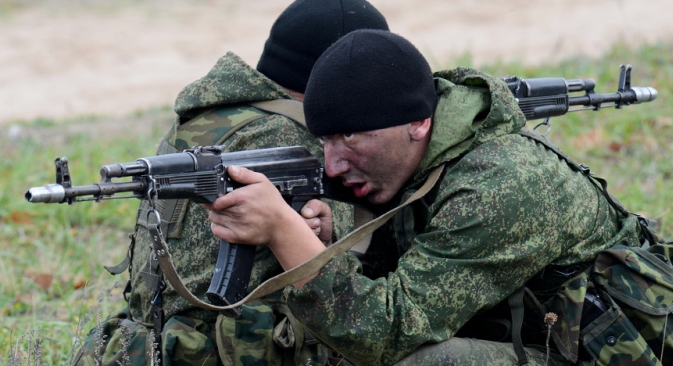
Russia's special operations forces are comig back. Source: Defense Ministry / Mil.ru
Valery Gerasimov, Russia’s chief of the General Staff, stated that the decision to revive the special operations wing of the country’s armed forces was based on the experience that leading nations have in forming, training and using special operations units. This includes the experience of the best-known unit of them all – the United States Special Operations Command (SOCOM).
Such units have completely altered the very concept of special forces and their operating methods. The key difference is that command identifies only the scene of operations, whereas special operations units act autonomously and define their objectives independently, in order to accomplish the ultimate mission. They are actively engaged with space and tactical reconnaissance units, and they involve army, air force and navy units.
Some examples of such operations include SOCOM activities in Yugoslavia, where special units directed planes and cruise missiles to strategically important infrastructure units in Serbia and Montenegro from the rear of the Yugoslav army. Also noteworthy are combat operations in Iraq, Afghanistan and Libya, where SOCOM acted as an autonomous spearhead unit of the U.S. Army, capable of independent actions taken to eliminate enemy personnel and infrastructure.
The Soviet counterpart to SOCOM was the Spetsnaz GRU – eleven brigades controlled by the Main Intelligence Directorate (or GRU in Russian). Some of them were designed for land operations, while others performed naval missions. Spetsnaz proved itself to be highly efficient unit during the Soviet military campaign in Afghanistan, the two wars in Chechnya and the war with Georgia in 2008.
The experience that special operations units gained during the most recent conflict in Georgia encouraged the General Staff to reform the system of special services of the Russian armed forces. However, the Minister of Defense at the time, Anatoly Serdyukov, did not approve the initiative.
Instead, Serdyukov decided to abolish the special operations wing of the GRU, leaving only strategic functions such as analysis and human/radio-electronic intelligence. As a result, the Spetsnaz GRU was placed under the control of military regions and fleets; the special forces lost a great deal of their personnel.
As soon as Sergei Shoigu was appointed minister, the Russian Ministry of Defense deemed it necessary to form a special operations command – especially given the Pentagon’s recently announced plans to markedly increase its number of secret operations abroad.
According to a GRU veteran who wished to remain anonymous, the current initiatives of the General Staff will become another step in the evolution of the Spetsnaz GRU. The change in approach has been prompted by the experience of the leading armies of the world – including the U.S. Army – which operate similar combat units. “We need to meet the new standard,” the specialist said.
According to Gerasimov, the special operations forces will have the same tasks that the Spetsnaz GRU used to have: tactical reconnaissance and target marking for strike forces; sabotage operations in the deep rear; the elimination of enemy commanders; and the capture of strategic infrastructure facilities.
Just as important is the use of special operations forces to protect Russian citizens abroad: for example, the protection of Russian diplomats during regional armed conflicts or terrorist threats. The special forces had already been used to rescue the crew of the MV Moscow University GT tanker, which had been captured by Somali pirates.
The creation of the special operations forces is essentially an effort to bring together the components of the reduced operations force of the GRU. The change in their functions – from tactical operations under the control of military regions and fleets to strategic missions serving the interests of the entire country – means that the special operations forces will report directly to the chief of the General Staff when it comes to tactical operations.
However, the use of the new service beyond the borders of Russia will have to be authorized personally by the president of Russia and approved by the State Duma.
The most important question that still remains unanswered is what threats the special operations forces will have to respond to. The GRU veteran source was unable to provide insight on the matter, since he left the military intelligence agency back in the early 1990s, when the objectives of the Spetsnaz GRU were different.
One can assume that the efforts by the General Staff to create the new force have been prompted by the upcoming withdrawal of U.S. troops from Afghanistan and the need to prevent the penetration of Islamic militants to the former Soviet Union.
The special operations forces may also become a response to the deployment of the U.S. missile defense in Europe. In any case, Gerasimov has repeatedly mentioned asymmetrical countermeasures to U.S. initiatives. However, this is just guesswork.
Neither the Ministry of Defense nor the General Staff will ever provide specific answers, because the very imperative of the special services controlled by the GRU and their operations has always been and will always be secrecy.
All rights reserved by Rossiyskaya Gazeta.
Subscribe
to our newsletter!
Get the week's best stories straight to your inbox